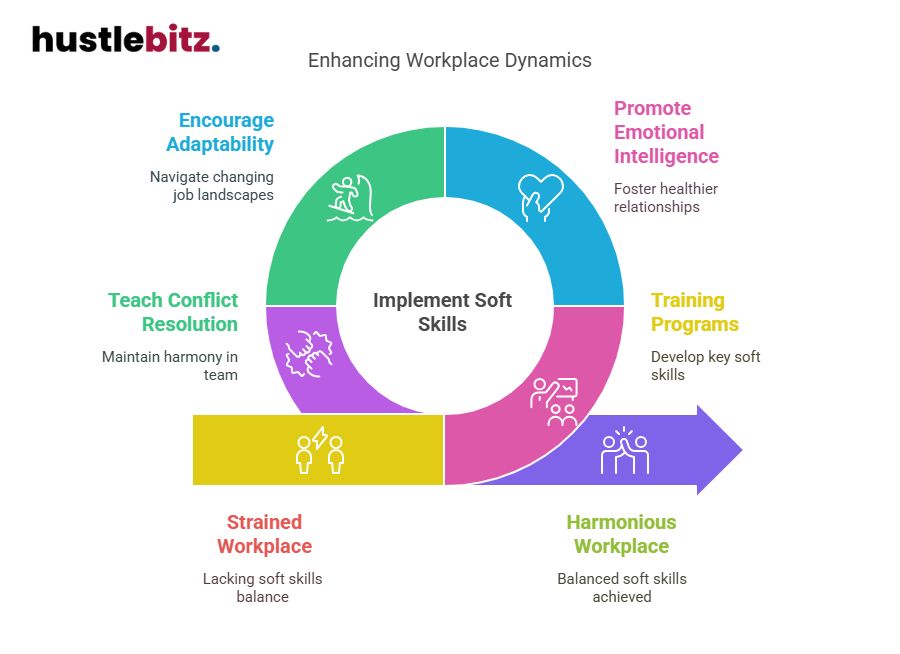In today’s competitive job market, soft skills have become increasingly vital for employability and organizational success. These interpersonal attributes—including emotional intelligence, adaptability, and effective communication—foster collaboration and enhance relationships within the workplace. Companies value professionals who can navigate complex team dynamics, resolve conflicts amicably, and adapt to rapid changes. Unlike hard skills, which are often technical, soft skills can be developed through intentional practice and real-life experiences. Their importance in cultivating positive organizational culture and improving team dynamics cannot be overstated, indicating that there’s much more to discover about their transformative power.
Key Takeaways
- Soft skills enhance collaboration and communication, leading to increased productivity and job satisfaction in diverse work environments.
- Emotional intelligence fosters healthier relationships, creating a supportive culture vital for employee engagement and retention.
- Adaptability equips individuals to navigate changing job landscapes, ensuring resilience amid unexpected challenges.
- Conflict resolution skills contribute to positive team dynamics, helping to maintain harmony and strengthen interpersonal relationships.
- A balance of soft and hard skills is essential for employability, meeting the demands of today’s dynamic job market.

Definition of Soft Skills
Soft skills refer to a set of interpersonal attributes and communication abilities that enhance an individual’s interactions, collaboration, and overall effectiveness in the workplace. These skills encompass a range of competencies that are vital in fostering positive relationships and creating a supportive work environment, particularly for those committed to serving others.
One crucial component of soft skills is emotional intelligence, which enables individuals to recognize, understand, and manage their own emotions while empathizing with others. This skill is essential for developing effective communication styles, allowing for clear and compassionate exchanges that can lead to improved teamwork and cooperation.
Adaptability strategies are also integral to soft skills, as they empower individuals to navigate changing circumstances and respond effectively to unexpected challenges. This flexibility fosters resilience and encourages collaborative problem-solving, which is particularly important in serving diverse communities.
Moreover, strong conflict resolution abilities are a hallmark of effective soft skills. The capacity to address and resolve disagreements constructively not only strengthens interpersonal relationships but also enhances group dynamics and overall productivity.
Importance in the Workplace

The significance of soft skills in the workplace cannot be overstated, as they directly contribute to enhanced collaboration, productivity, and overall job satisfaction among employees. In an environment where teams must work harmoniously to achieve common goals, the ability to employ effective communication strategies and demonstrate emotional intelligence becomes crucial. These skills foster trust and understanding, enabling individuals to connect on a deeper level.
The importance of soft skills can be summarized in the following key areas:
- Effective Communication: Clear and concise communication strategies help in conveying ideas and expectations, reducing misunderstandings and fostering a more cohesive work environment.
- Emotional Intelligence: Understanding and managing one’s emotions, as well as empathizing with others, allows for healthier interpersonal relationships and encourages a supportive workplace culture.
- Conflict Resolution: The ability to navigate and resolve conflicts amicably is essential for maintaining positive relationships and ensuring that team dynamics remain intact.
- Adaptability Training: In an ever-changing work landscape, being adaptable is vital. Employees who can adjust to new challenges demonstrate resilience and a willingness to grow, which are essential leadership qualities.
Ultimately, cultivating these soft skills not only enhances individual performance but also creates a more inclusive and productive workplace. As organizations increasingly recognize the value of soft skills, investing in training and development becomes imperative for fostering an environment that prioritizes collaboration and mutual support.
Key Soft Skills for Success

Key skills such as communication, teamwork, and problem-solving are essential for achieving success in today’s competitive job market. These soft skills not only enhance individual performance but also contribute to a collaborative and supportive workplace culture. Here are some key soft skills that are vital for professional growth:
| Soft Skill | Description |
| Communication Strategies | Effective verbal and non-verbal exchanges that foster understanding and collaboration. |
| Emotional Intelligence | The ability to recognize, understand, and manage one’s own emotions while empathizing with others. |
| Adaptability Training | The capacity to adjust to new conditions and challenges, ensuring resilience in a dynamic work environment. |
| Conflict Resolution | Skills to address disagreements constructively, leading to healthier relationships and a more cohesive team. |
Developing leadership qualities is crucial as well; strong leaders inspire and motivate their teams while promoting an inclusive atmosphere. By mastering communication strategies, professionals can navigate complex social dynamics, enhancing teamwork and overall productivity. Emotional intelligence plays a pivotal role in fostering trust and empathy, ensuring that team members feel valued and understood.
Incorporating adaptability training equips employees with the tools to manage change effectively, a necessity in today’s rapidly evolving job landscape. Finally, honing conflict resolution skills empowers individuals to tackle disagreements head-on, creating a more harmonious workplace. By prioritizing these key soft skills, individuals can not only advance their careers but also contribute positively to their organizations and the communities they serve.
Soft Skills Vs. Hard Skills
Understanding the distinction between soft skills and hard skills is essential for navigating today’s job market effectively. While hard skills refer to the technical abilities and knowledge specific to a particular industry, soft skills encompass interpersonal skills that enhance collaboration and communication. Addressing common soft skills misconceptions can help job seekers recognize their importance alongside hard skills.
Consider the following aspects when evaluating soft and hard skills:
- Hard Skills Advantages: Hard skills often provide a clear advantage in technical tasks, enabling employees to perform industry-specific functions effectively. Proficiency in software, tools, or methodologies can set candidates apart.
- Soft Skills Development: Unlike hard skills that may require formal education, soft skills can be developed through life experiences and intentional practice. Engaging in volunteer work or group activities can enhance these skills.
- Skillset Balance: Achieving a skillset balance between soft and hard skills is crucial. Employers increasingly seek candidates who not only possess technical expertise but also demonstrate emotional intelligence, adaptability, and teamwork.
- Skill Development Strategies: Incorporating skill development strategies into your career plan—such as seeking mentorship or participating in workshops—can strengthen both hard and soft skills, making you more marketable.
In today’s job market, understanding the interplay between soft skills and hard skills is vital for serving others effectively and fostering a positive workplace culture. By recognizing their unique contributions, individuals can position themselves as well-rounded candidates.
Impact on Team Dynamics

Effective soft skills significantly influence team dynamics by fostering collaboration, enhancing communication, and promoting a positive work environment.
In today’s diverse workplace, strong interpersonal relationships are vital for successful team collaboration. Team members who possess effective communication styles are better equipped to express their ideas, actively listen to one another, and provide constructive feedback. This open exchange of thoughts and perspectives builds trust and respect among colleagues, creating a solid foundation for cooperative efforts.
Furthermore, soft skills play a crucial role in conflict resolution. When challenges arise, team members with strong emotional intelligence can navigate disagreements with empathy and tact, ensuring that conflicts are addressed without damaging interpersonal relationships. By facilitating open dialogues, these individuals help to clarify misunderstandings and reinforce a culture of collaboration.
Leadership dynamics are also enhanced through soft skills. Leaders who demonstrate emotional intelligence and effective communication inspire their teams to perform at their best. They create an inclusive atmosphere where each member feels valued and heard, encouraging participation and innovation.
This kind of leadership not only boosts morale but also aligns team objectives with the organization’s mission.
Soft Skills in Remote Work

As teams increasingly operate in remote environments, the importance of soft skills becomes even more pronounced in fostering collaboration and maintaining strong interpersonal relationships. The unique challenges posed by remote work necessitate a refined set of soft skills that can enhance teamwork and productivity.
Here are four essential soft skills for thriving in a remote work environment:
- Effective Communication: Navigating communication challenges is crucial when team members are dispersed. Clear and concise messaging helps prevent misunderstandings and keeps everyone aligned.
- Emotional Intelligence: Understanding and managing one’s emotions, as well as empathizing with others, is key to building trust and rapport in virtual collaboration. Emotional intelligence enables team members to respond thoughtfully to colleagues’ needs and concerns.
- Adaptability Strategies: The remote work landscape is continually evolving, requiring individuals to be flexible and open to change. Adaptability strategies allow team members to pivot quickly and embrace new tools or workflows.
- Remote Leadership: Strong remote leadership relies on the ability to inspire and motivate teams from a distance. Leaders must cultivate a sense of belonging and encourage collaboration, despite the physical separation.
Developing Soft Skills

Cultivating soft skills is essential for professionals seeking to enhance their employability and adapt to the dynamic demands of today’s job market. These interpersonal abilities not only foster better workplace relationships but also contribute significantly to a positive organizational culture. To develop these skills effectively, individuals can engage in various targeted activities that promote growth.
Active listening techniques are fundamental in enhancing communication. By focusing fully on the speaker and reflecting on their message, professionals can build trust and understanding.
Additionally, emotional intelligence training is invaluable, as it enables individuals to recognize and manage their own emotions while empathizing with others. This skill is particularly crucial in roles that require a compassionate approach to service.
Conflict resolution strategies are indispensable for maintaining harmony in teams. Learning how to navigate disputes respectfully and constructively can lead to stronger collaboration and productivity.
Likewise, adaptability exercises help professionals stay resilient in the face of change, ensuring they can pivot in response to evolving job requirements or client needs.
Lastly, participation in communication workshops equips individuals with the tools necessary to convey their ideas clearly and effectively. These workshops often involve practical scenarios, allowing participants to practice and refine their skills in real-time.
Final Thoughts
In today’s job market, soft skills are more important than ever for achieving success and fostering positive workplace relationships. By developing skills such as emotional intelligence, effective communication, adaptability, and conflict resolution, professionals can enhance their employability and contribute to a collaborative organizational culture. Understanding the interplay between soft and hard skills is crucial for navigating career paths and building strong teams. As the workplace continues to evolve, prioritizing the cultivation of soft skills will not only empower individuals but also create a more inclusive and productive environment for everyone. Embrace the power of soft skills and position yourself for a fulfilling career ahead.




